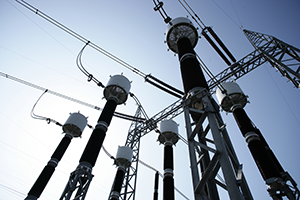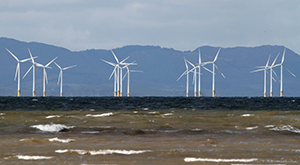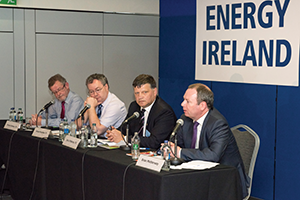
Growing sustainably by connecting Europe
25th September 2015
The future of renewable energy in Ireland
25th September 2015Political parties’ energy priorities

A key feature of the programme at this year’s Energy Ireland® conference was a panel discussion featuring representatives of the leading political parties who were given an opportunity to outline their key policy priorities in relation to energy and climate change ahead of Election 2016.
Q. Are you prepared to stand, defend and own European policies on climate change?
John O’ Mahony: The answer is yes…I remember in 2007 or 2006 when wind was first being put forward. Coming from the west of Ireland, with a big wind capacity, many people came to me and said: ‘We need to get in on this, we’ve missed out on so much more in the west. We have so much potential here.’
Seven or eight years later, some of the same people came forward and said: ‘You cannot put pylons, you cannot put wind farms [here], you cannot…’ So what we need to do, first of all, it comes back to the community buy in. It comes back to educating – create a need that this is good for this community.
Certainly, stand up for European directives but they have to be properly explained. Because when it’s at one period, ‘Europe was our friend’ and now all of a sudden it’s ‘Europe is our enemy’, I think there is a process there to be fine tuned better than it has been and that would get over that [hurdle].
Michael Moynihan: Europe has set out the policies in relation to renewable energy and by and large, the vast majority of people have been buying into it. What I see around the country, where wind farms were away from domestic houses or residential areas, there wasn’t any issue. I think the public have bought into it.
Even if you look at what was happening in the Ukraine over the last short while, people were talking about whether or not the tap would be turned off on gas and if that would be an issue. People are very clued into what is happening in the world stage and how it is going to directly affect Ireland or their own pocket and they are tuned in to what is happening at a European level.
I think by and large there is a general acceptance that the energy policy is there for the betterment of society or the betterment of mankind. But, there are tweaks and balances and people at the coalface have to feed into the policy as well. There has to be a perspective of what can be sustainable in Ireland going forward.
Michael Colreavy: I am passionate about public participation and the closer we get to public ownership the better the solution is going to be for energy. People need to appreciate expansive infrastructure, people need to understand the benefits it will have for them. People need to take ownership.
People can only do that when they have the information at an early stage and they are participating themselves. I would like to see energy co-ops the length and breadth of this country. I think we need to look again at co-operatives for our people.
Q. Should Ireland be encouraging the export of surplus offshore wind energy to Europe to assist deficient countries?
John O’ Mahony: I don’t see why there would be an objection to that as long as it doesn’t affect our own security [and] if we can benefit economically from the resources we have and use them in any we can if it can be structured correctly.
Michael Colreavy: Many people have a misconception of Sinn Féin in relation to energy. Some people say Sinn Féin, they’re anti-private profit. We’re not. Companies exist to make profit – we understand that. What we do is try to ensure that the citizens get value, but we would certainly not be into profit.
In terms of sharing the resources we have with others, of course we should.
I understand and support the concept of the single European unit. If we have a supply of something that is needed in France at a certain point in time, go for it. What we would say is first, we hit our own targets then we export and it needs to be done in a way that the citizens get full value for it. Just as the citizens of the other European nations would expect to get full value for theirs as well.
Q. Trees are a natural decarboniser, but Ireland is the least forested country in Europe. Do you think enough is being done by the various government departments and authorities to have a solid forestation policy?
John O’ Mahony: Forestry is now at 11 per cent, I remember way, way back when it was down to 6 per cent and I think at one stage, way further back it was at 20 per cent. So there is a potential there.
In my own county, [in June] there was a power plant announced for Killala. They will have to import bio-mass for a period. The real solution there is that all of the communities and the marginal land in north Mayo and the west of Ireland would actually produce the biomass that is necessary at a local level. That is the solution we would all want to get to. I think that the one thing about policies is that there needs to be common sense in them and sometimes that’s missing in them.
Michael Moynihan: I think there has been a lot of work done of the last number of years and even the afforestation of land guidelines that were set by the department – by the European Commission on the CAP reform going back seven years ago, as opposed to the current ones – they have been modified to make sure that more people buy into it.
There are other issues. I come from a part of the country [called] Rockchapel, a village on the Cork/Kerry/Limerick border, where 60 per cent of that land is forested. There’s a big issue there in that they are saying the trees are taking over from the people. So there has to be a balance and we do need to get up to 20 per cent. More has to be done as it is one of the resources that we can have that can lead to [advances] on the carbon side, first of all, and the other side, in relation to the sustainability of energy or an alternative for energy.
Michael Colreavy: This is one of the reasons we [Sinn Féin] put forward that an organisation like ESB, Bord na Móna and Coillte would play a leading role here. Energy efficiency, renewable energy…I don’t think there is a single solution. Wind on its own is not going to solve it. We need a broad base. Are we just looking at the profits that can be got from it…? Or are we looking at the best mix that can secure this planet, and this part of the planet, for the future?
Certainly, we would see potential for increasing the level of afforestation in this country. We would also see, for example, combining afforestation with wind turbines perhaps as a solution. We have to break down the barriers between the different technologies and break down the barriers between different companies and get rid of the bunker management way of thinking. And have companies, politicians and people look at what can we do that is clean, sustainable, secure, effective and that we can afford to pay for it. It does need a new way of thinking for all of the agencies involved.
Q. If climate change is the most serious issue facing humanity, why is there not more joined-up thinking at government level? How can politicians take the issue of climate to the level required?
A. Michael Moynihan: In relation to the whole issue of climate change, there is a massive lack of will and a massive lack of engagement. Just to illustrate the point, during the very wet summer of 2012…there was a farmers meeting because there was a crisis in relation to the harvesting crops. Some of the younger people were saying it was climate change, that we were getting wetter summers and warmer winters and that this was a whole climate change issue.
I still remember a man standing up at the back saying: ‘Will you for God’s sake stop talking about climate change, these wet summers were coming 50/60 years ago.’ …naming out all the years it happened. And there was a kind of guffaw of laughter and applause for him. Kind of meaning ‘Will you move on from this nonsensical debate onto the real issue of about getting the silage out of the fields…’
That is where there is a switch off from it. We do have to have a massive discussion on it. If you go into any of our political party meetings around the country, the last thing they will talk about is climate change because they don’t want to tackle it, because there are so many issues that need to be tackled. While we can take the lead on it, the citizen must be engaged in it. Because the citizen as of now, there’s no point in codding ourselves, is not engaged in it.
Michael Colreavy: I think you’re right. There’s an absence of joined up thinking. In my office, there’s myself and Sean O’Shea. Sean is excellent, but he can’t know everything. We outreach an awful lot to various agencies and organisations and get information from them. But of course, there should be more joined up thinking and we have a long, long way to go. The first thing to do is to stand up if we don’t know something… and try to go out and get the information.
John O’Mahony: I was at the Sustainable Energy Awards, I was taken with two of the award-winning projects there. One was the Aran Islanders where you have a community who seem at one with climate change and sustainability. My local factory Aurivo who invested €5 million which they will save over two or three years with the biomass issue. So there are things happening – not enough of it. There needs to be more of it.
The panel participants: Parties’ energy spokespersons
The panel discussion session was chaired by Brian Motherway, Chief Executive Officer of the Sustainable Energy Authority of Ireland.
John O’Mahony is a Fine Gael TD for Mayo. A former secondary school teacher, he was first elected to Dáil Éireann in 2007. He is currently the Chairman of the Transport and Communications Committee. He is a native of Magheraboy, Kilmovee, County Mayo.
Michael Colreavy has been a Sinn Féin TD for Sligo-North Leitrim since 2011. He spent 12 years before that as a councillor on Leitrim County Council. He is a member of the Joint Oireachtas Committee on Communications, Energy and Natural Resources.
Michael Moynihan is a Fianna Fáil TD for Cork North West. He first took a seat in the Dáil in 1997 at 29 years of age. Prior to this, upon leaving school, he had worked for 10 years as a dairy farmer. He is the Fianna Fáil spokesperson on communications, energy and natural resources.
The panel participants: Parties energy spokespersons

The panel discussion session was chaired by Brian Motherway, Chief Executive Officer of the Sustainable Energy Authority of Ireland.
John O’Mahony is a Fine Gael TD for Mayo. A former secondary school teacher, he was first elected to Dáil Éireann in 2007. He is currently the Chairman of the Transport and Communications Committee. He is a native of Magheraboy, Kilmovee, County Mayo.
Michael Colreavy has been a Sinn Féin TD for Sligo-North Leitrim since 2011. He spent 12 years before that as a councillor on Leitrim County Council. He is a member of the Joint Oireachtas Committee on Communications, Energy and Natural Resources.
Michael Moynihan is a Fianna Fáil TD for Cork North West. He first took a seat in the Dáil in 1997 at 29 years of age. Prior to this, upon leaving school, he had worked for 10 years as a dairy farmer. He is the Fianna Fáil spokesperson on communications, energy and natural resources.







